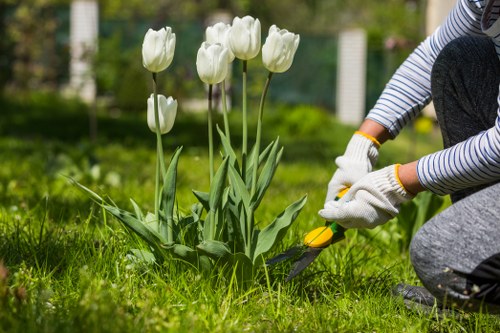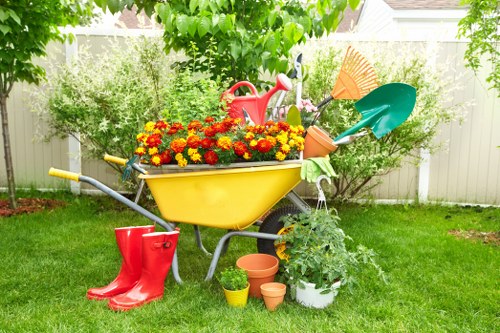Comprehensive Guide to Garden Maintenance in Chessington
Introduction to Garden Maintenance

Maintaining a beautiful garden in Chessington requires dedication, knowledge, and the right tools. Whether you’re a seasoned gardener or just starting out, understanding the basics of garden maintenance can transform your outdoor space into a serene and vibrant haven.
Chessington’s unique climate and soil conditions offer both opportunities and challenges for gardeners. By tailoring your maintenance practices to the local environment, you can ensure your garden thrives year-round.
In this guide, we will explore various aspects of garden maintenance, from seasonal tasks to specific care techniques, ensuring your Chessington garden remains lush and healthy.
Seasonal Garden Care

Spring Maintenance
Spring is a crucial time for garden maintenance. As the weather warms up, it’s essential to prepare your garden for the growing season ahead.
Start by clearing away any debris accumulated over the winter. This includes fallen leaves, dead branches, and any other organic matter that may hinder plant growth.
Pruning is another vital task in spring. Focus on removing dead or diseased branches to promote healthy growth and improve the overall appearance of your plants.
Soil Preparation
Good soil is the foundation of a healthy garden. Consider testing your soil’s pH and nutrient levels to determine what amendments it may need.
Adding compost or well-rotted manure can enrich the soil, providing essential nutrients for your plants. Additionally, aerating the soil helps improve drainage and root growth.
Planting
Spring is the perfect time to plant new flowers, shrubs, and trees. Choose native species that are well-suited to Chessington’s climate to ensure they thrive with minimal maintenance.
Pro Tip: Plant early in the season to give your plants ample time to establish before the heat of summer.Summer Garden Maintenance

Watering Strategies
Summer heat can be challenging for gardens. Proper watering is essential to keep your plants healthy and vibrant.
Water your garden early in the morning or late in the evening to reduce evaporation and ensure that the moisture penetrates deep into the soil.
Using drip irrigation systems can provide consistent watering while conserving water, making them an excellent choice for sustainable garden maintenance.
Pest Control
Summer is peak time for garden pests. Regularly inspect your plants for signs of infestation and take prompt action to prevent the spread of pests.
Opt for organic pest control methods, such as introducing beneficial insects or using natural repellents, to protect your garden without harming the environment.
Mulching
Applying mulch helps retain soil moisture, suppress weeds, and regulate soil temperature. Choose organic mulches like wood chips or straw to improve soil health over time.
Remember: Mulching not only benefits your plants but also reduces the need for frequent watering.Autumn Garden Maintenance

Preparing for Winter
As autumn approaches, it’s time to prepare your garden for the colder months. Start by cleaning up fallen leaves and debris to prevent pests and diseases from taking hold.
Prune perennials and deadheading annuals can promote healthier growth in the next growing season. It’s also a good time to divide and transplant any overcrowded plants.
Planting bulbs in the autumn ensures a colorful spring garden. Choose bulb varieties that are suitable for Chessington’s climate to guarantee successful blooms.
Soil Health
Enrich your soil by adding compost or organic matter in the autumn. This feeds the soil microbiome and improves its structure, making it more resilient against winter stresses.
Cover crops can also be planted to prevent soil erosion and enhance nutrient content. These crops are usually tilled back into the soil in the spring.
Garden Tools Maintenance
Proper maintenance of your garden tools extends their lifespan and ensures they remain effective. Clean and sharpen tools at the end of the season, and store them in a dry place to prevent rusting.
Tip: Consider investing in high-quality tools that make garden maintenance easier and more efficient.Year-Round Garden Maintenance Tips

Regular Weeding
Weeds compete with your plants for nutrients, water, and light. Regularly removing weeds is essential to maintain a healthy garden.
Hand-pulling weeds is effective, especially before they set seeds. For larger gardens, consider using a hoe or other gardening tools to manage weed growth.
Applying mulch, as mentioned earlier, also helps suppress weed growth, reducing the labor required for weeding.
Pruning and Trimming
Consistent pruning encourages healthy plant growth and maintains the desired shape and size of your plants.
Remove any dead or damaged branches and thin out dense areas to improve air circulation. This helps prevent fungal diseases and promotes vigorous growth.
Fertilizing
Supplementing the soil with fertilizers provides essential nutrients that plants need to thrive. Choose fertilizers based on the specific needs of your plants.
Organic fertilizers, such as compost or fish emulsion, are environmentally friendly options that enhance soil health over time.
Pro Tip: Avoid over-fertilizing, as this can lead to nutrient imbalances and harm your plants.Choosing the Right Plants for Chessington Gardens
Native vs. Non-Native Plants
Selecting the right plants is crucial for a thriving garden. Native plants are well-adapted to Chessington’s climate and soil conditions, making them easier to maintain.
They often require less water, fertilizer, and pest control, allowing your garden to flourish with minimal intervention.
Non-native plants can also be beautiful additions but may require more care and attention. Ensure you research their needs and suitability for your local environment.
Perennials vs. Annuals
Perennials are plants that live for more than two years, providing long-term color and structure to your garden.
Annuals, on the other hand, complete their life cycle in one growing season but offer vibrant, seasonal blooms that can be changed each year.
Flowering Plants
Choose a variety of flowering plants to ensure your garden has color throughout the seasons. Mix early, mid, and late-season bloomers for continuous interest.
Consider planting shrubs and trees with flowers to add vertical interest and structure to your garden landscape.
Remember: A diverse selection of plants attracts pollinators and enhances the overall ecosystem of your garden.Improving Garden Aesthetics
Lawn Care
A well-maintained lawn serves as the foundation of your garden’s aesthetics. Regular mowing, watering, and fertilizing keep the grass healthy and green.
Overseeding bare patches and aerating the soil can prevent issues like weed invasion and soil compaction.
Consider using eco-friendly lawn care practices to reduce environmental impact while maintaining a beautiful lawn.
Pathways and Borders
Adding pathways and borders can enhance the visual appeal of your garden and provide structure. Use materials that complement your garden’s style, such as gravel, brick, or stone.
Define different garden areas with borders using plants, edging materials, or decorative elements to create a cohesive and organized space.
Lighting
Garden lighting not only adds beauty but also extends the usability of your garden into the evening hours.
Use a combination of ambient, task, and accent lighting to highlight key features, such as trees, statues, or water features.
Tip: Solar-powered lights are an energy-efficient option that reduces your garden’s carbon footprint.Sustainable Garden Practices
Composting
Composting is an eco-friendly way to recycle garden waste and produce nutrient-rich soil amendments.
Start a compost bin by layering organic materials like leaves, grass clippings, and kitchen scraps. Regularly turn the compost to aerate it and speed up the decomposition process.
Use the finished compost to enrich your garden soil, improving its structure and fertility.
Rainwater Harvesting
Collecting rainwater helps conserve water and reduces your reliance on municipal water sources. Install rain barrels or other harvesting systems to capture runoff from your roof.
Use the collected rainwater to irrigate your garden, especially during dry periods, ensuring your plants receive adequate moisture.
Organic Gardening
Organic gardening promotes the use of natural methods to grow plants without synthetic chemicals. Focus on techniques like crop rotation, companion planting, and natural pest control.
This approach not only benefits the environment but also produces healthier and more resilient plants.
Remember: Sustainable practices contribute to a healthier garden and a healthier planet.Hiring Professional Garden Maintenance Services
Benefits of Professional Help
While DIY garden maintenance can be rewarding, hiring professional services in Chessington offers several advantages.
Professionals have the expertise and equipment to handle complex tasks efficiently, saving you time and effort.
They can also provide tailored advice and solutions to address specific garden challenges, ensuring optimal results.
Choosing the Right Service
When selecting a garden maintenance service, consider their experience, reputation, and range of services offered.
Look for companies that understand the local climate and plant varieties, ensuring they can cater to your garden’s unique needs.
Cost Considerations
While professional services come with a cost, the investment can lead to long-term savings by preventing costly issues and enhancing your garden’s value.
Obtain multiple quotes and compare services to find the best fit for your budget and requirements.
Call to Action: Contact us today to discover how our professional garden maintenance services can transform your Chessington garden.Common Garden Maintenance Challenges in Chessington
Pest Management
Pests can pose significant threats to your garden’s health. Common pests in Chessington include aphids, slugs, and snails.
Implement integrated pest management (IPM) strategies to control pests effectively while minimizing environmental impact.
Regular monitoring and early intervention are key to preventing pest infestations from escalating.
Disease Prevention
Plant diseases, such as powdery mildew and root rot, can weaken your plants and reduce their aesthetic appeal.
Maintain good garden hygiene by removing infected plants and debris, and ensure proper spacing and air circulation to reduce disease risk.
Weather Extremes
Chessington experiences a range of weather conditions that can affect your garden. Protect plants from extreme heat by providing shade or additional watering.
In colder months, use frost covers or mulching to shield plants from frost damage and temperature fluctuations.
Pro Tip: Stay informed about local weather forecasts to anticipate and prepare for weather-related challenges.Innovative Garden Maintenance Techniques
Smart Irrigation Systems
Embrace technology with smart irrigation systems that adjust watering schedules based on weather conditions and soil moisture levels.
This not only conserves water but also ensures your plants receive the optimal amount of moisture for healthy growth.
Remote monitoring and control via smartphone apps add convenience and precision to your garden maintenance routine.
Vertical Gardening
Maximize space and add visual interest with vertical gardening. Use trellises, wall-mounted planters, or vertical structures to grow climbing plants and herbs.
This technique is particularly useful for small gardens or patios, allowing you to cultivate a diverse range of plants in limited space.
Permaculture Principles
Incorporate permaculture principles to create a sustainable and self-sufficient garden ecosystem. Focus on biodiversity, water conservation, and minimizing waste.
Design your garden to mimic natural ecosystems, promoting resilience and long-term sustainability.
Remember: Innovative techniques can enhance both the functionality and beauty of your garden.Tools and Equipment for Effective Garden Maintenance
Essential Gardening Tools
Having the right tools is essential for efficient garden maintenance. Invest in high-quality tools such as:
- Pruning shears
- Garden hoes
- Shovels and spades
- Rakes and trowels
- Wheelbarrows
These tools will help you perform a variety of tasks with ease, from planting and pruning to weeding and soil preparation.
Power Tools and Equipment
Power tools can significantly reduce the time and effort required for garden maintenance. Consider equipment such as:
- Electric or gas-powered lawn mowers
- String trimmers
- Hedge trimmers
- Chainsaws
- Leaf blowers
Always prioritize safety by following manufacturer instructions and wearing appropriate protective gear when using power tools.
Storage Solutions
Proper storage of your gardening tools and equipment ensures their longevity and keeps your garden tidy.
Use sheds, toolboxes, or dedicated storage areas to organize your tools, protecting them from weather damage and theft.
Tip: Label storage spaces and maintain a regular cleaning schedule to keep tools in optimal condition.Enhancing Garden Biodiversity
Planting for Wildlife
A diverse garden attracts a variety of wildlife, including birds, bees, and beneficial insects.
Incorporate a mix of flowering plants, shrubs, and trees to provide habitats and food sources throughout the year.
Consider installing birdhouses, bat boxes, and insect hotels to support local fauna and promote ecological balance.
Pollinator Gardens
Pollinators play a crucial role in the health of your garden. Plant native flowers that attract bees, butterflies, and other pollinators.
Avoid using pesticides that can harm these beneficial insects, opting for natural pest control methods instead.
Beneficial Insects
Introduce beneficial insects, such as ladybugs and lacewings, which help control pest populations naturally.
Providing a habitat rich in nectar and pollen encourages these insects to thrive in your garden.
Remember: Enhancing biodiversity leads to a more resilient and vibrant garden ecosystem.Conclusion
Effective garden maintenance in Chessington involves a combination of seasonal care, sustainable practices, and the right tools and techniques. By understanding the unique challenges and opportunities of the local environment, you can create and maintain a garden that is not only beautiful but also resilient and thriving year-round.
Whether you choose to undertake garden maintenance yourself or hire professional services, the key is to stay informed, plan ahead, and adapt to changing conditions. With dedication and the right approach, your Chessington garden can become a stunning and peaceful retreat.
Ready to transform your garden? Book your service now and let our experts help you achieve the garden of your dreams.